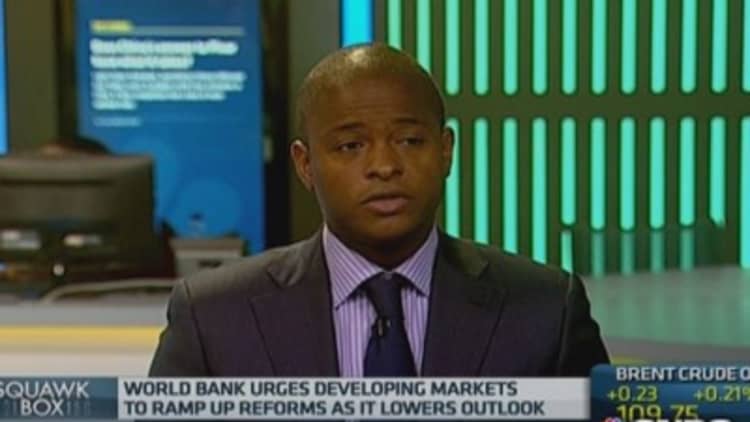The International Monetary Fund (IMF) has downgraded its global growth forecast for 2014, citing a weaker-than-expected first quarter, particularly in the U.S., and a "less optimistic" outlook for several emerging markets.
The global economy will likely expand 3.4 percent this year, a cut of 0.3 percentage points from April's estimate, but still an improvement from 3.2 percent in 2013, the IMF said.
"Global growth could be weaker for longer, given the lack of robust momentum in advanced economies despite very low interest rates and the easing of other brakes to the recovery," the IMF said in its World Economic Outlook update published on Thursday.
"In some major emerging market economies, the negative growth effects of supply-side constraints and the tightening of financial conditions over the past year could be more protracted," it added. Central banks in several emerging markets including Brazil, Indonesia and Turkey have aggressively raised interest rates over 2013-2014, leading to tighter financial conditions.
With somewhat stronger growth expected in some advanced economies next year, the IMF maintained its 2015 global growth forecast of 4.0 percent.
The IMF cut its 2014 growth outlook for the U.S., by 1.1 percentage points to 1.7 percent, saying that while a rebound is underway, it is only expected to provide a partial offset to the weak first quarter outcome given a rather muted recovery in investment.
The world's largest economy contracted at an annual pace of 2.9 percent in the first three months of the year, the sharpest decline in five years, owing to a weak housing market, a slower pace of restocking by businesses and lower exports.
Growth in the euro zone is expected to strengthen to 1.1 percent, from a 0.4 percent contraction last year. But the fund notes the recovery will remain uneven across the region, reflecting "continued financial fragmentation, impaired private and public sector balance sheets, and high unemployment in some economies."
Read MoreGet used to slow growth, spotty world economy: CEO
Japan, meanwhile, is a relative bright spot among advanced economies. The fund raised its outlook for Asia's second largest economy by 0.3 percentage point to 1.6 percent for 2014, reflecting the positive effects of Abenomics - the term used to describe Prime Minister Shinzo Abe's economic revival program.
EMs to slow further
Weak growth is not only a problem for developed economies. The fund warned of more challenging environment for several emerging markets, putting its forecasts for Brazil, Mexico, South Africa and Russia under the knife.
Read MoreBackfire? How Russia sanctions could hit Europe
Russia suffered the steepest cut in the revised growth forecasts, with investment expected to remain weaker for longer due to geopolitical tensions. The fund expects the economy to expand just 0.2 percent this year, 1.1 percentage points lower than its previous estimate.

The IMF downgraded its overall growth outlook for emerging markets to 4.6 percent, from an earlier 4.8 percent, and down from 4.7 percent in 2013.
As for China, it forecasts the world's No.2 economy will expand 7.4 percent as targeted stimulus measures support activity for the remainder of the year. The economy grew 7.5 percent in the second quarter, marginally better than expected.
Read MoreChina HSBC flash PMI at 52, an 18-month high
The fund, meanwhile, painted a brighter picture for India, saying activity is likely to pick up gradually with the post-election recovery in business sentiment offsetting the effect of an unfavorable monsoon on agricultural growth. It sees growth rising to 5.4 percent, up from under 5 percent in the past two years.
Keep monetary punchbowl in place
With the global economy recovery remaining weak, monetary policy should remain accommodative in all major advanced economies, the IMF said.
The Federal Reserve began winding down its trillion-dollar stimulus program earlier this year and it's expected to start raising interest rates gradually in the first half of 2015.


